You are using an out of date browser. It may not display this or other websites correctly.
You should upgrade or use an alternative browser.
You should upgrade or use an alternative browser.
2025 Reading Challenge
- Thread starter Selaws
- Start date
WhiteDahlias
Active Member
Book 10. After Dark - Haruki Murakami
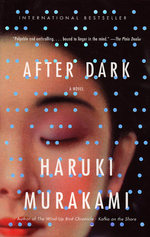
I admit, I got frustrated with this one when it immediately started with a young woman sitting alone in public and some man just invites himself to come up and start talking to her out of the blue, but I ended up enjoying this quite a bit more than some of Murakami's other books that I've read. It still had a lot of the usual Murakami-isms but the female characters had more going on than just existing to further the plot/sleep with a self-insert main character. I think the setting worked really well to add to the tone of the book as well. This surprised me that it became one of my favorite Murakami novels.
Book 11. Emma - Jane Austen

This is one of those books that I had been meaning to read forever and never made time to get around to (I'm pretty sure it was on my Goodreads tbr from before they were Amazon). I'm glad I finally picked it up though because it was such a fun novel and felt like a good read to move into spring. I'd put this among my favorites, the only thing I didn't love was the age gap between two important characters that in a modern lens feels kinda gross if you think about it too hard but I acknowledge that it was a different time. This is the third Jane Austen I've read and I'd currently put it at #2 after Pride and Prejudice though I do also have Sense and Sensibility I still need to read as well.
...also this cover is so pretty.
Only 2 for March but they were both good. Hoping things go well in April too!

I admit, I got frustrated with this one when it immediately started with a young woman sitting alone in public and some man just invites himself to come up and start talking to her out of the blue, but I ended up enjoying this quite a bit more than some of Murakami's other books that I've read. It still had a lot of the usual Murakami-isms but the female characters had more going on than just existing to further the plot/sleep with a self-insert main character. I think the setting worked really well to add to the tone of the book as well. This surprised me that it became one of my favorite Murakami novels.
Book 11. Emma - Jane Austen

This is one of those books that I had been meaning to read forever and never made time to get around to (I'm pretty sure it was on my Goodreads tbr from before they were Amazon). I'm glad I finally picked it up though because it was such a fun novel and felt like a good read to move into spring. I'd put this among my favorites, the only thing I didn't love was the age gap between two important characters that in a modern lens feels kinda gross if you think about it too hard but I acknowledge that it was a different time. This is the third Jane Austen I've read and I'd currently put it at #2 after Pride and Prejudice though I do also have Sense and Sensibility I still need to read as well.
...also this cover is so pretty.
Only 2 for March but they were both good. Hoping things go well in April too!
Mr Moore
Well-Known Member
March, 2025
Book 13: Taffy Brodesser-Akner - Fleishman is in Trouble (2019)
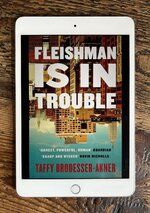
This was enjoyable, the writing was good and the plotting of a marriage in collapse had all the right elements. It felt a bit too heavily influenced by Updike or Roth at times as it tiptoed the line between sex comedy and family drama but, Akner uses the coda to put a feminist slant on the whole affair which prevents it being wholly derivative. The reminder to male readers of the differences women have to endure in a work/life/family balance is smart, not sledgehammered and gives the novel the capacity to remain a lingering experience.
Book 14: Paul Auster - Sunset Park (2010)

Really closing in on completing the read-through now and this was in fact, a reread. I enjoyed it, possibly more than I did the first time. It's a family drama with a troubled young man at its heart and a small surrounding cast of characters. He tries to re-enter their lives after dropping out of their orbit 8 years previous following a tragic accident. Smart writing, sad and joyful in equal measures.
I'll be skipping 4 3 2 1 as I read it only a few years ago and moving onto his swan song, Baumgartner next month.
Book 15: Attica Locke - Black Water Rising (2009)

This one was a bit of a slog. In all fairness, I changed shift at work and haven't had as much time as usual but, this one gave me no urge to find extra time like many books would. What starts off as a murder mystery in the Texas bayou slips into a Chinatown/Erin Brockovich style corporations doing wrong story and sadly, neither element was gripping enough. The main fault seemed to be that the story in the book's present was all too often set aside for character backstory, little of which really did much to bolster the narrative. Coupled with it all feeling a little too much like a rehash of multiple TV and movie legal procedurals and it ended up being nothing to write home about.
Book 13: Taffy Brodesser-Akner - Fleishman is in Trouble (2019)

This was enjoyable, the writing was good and the plotting of a marriage in collapse had all the right elements. It felt a bit too heavily influenced by Updike or Roth at times as it tiptoed the line between sex comedy and family drama but, Akner uses the coda to put a feminist slant on the whole affair which prevents it being wholly derivative. The reminder to male readers of the differences women have to endure in a work/life/family balance is smart, not sledgehammered and gives the novel the capacity to remain a lingering experience.
Book 14: Paul Auster - Sunset Park (2010)

Really closing in on completing the read-through now and this was in fact, a reread. I enjoyed it, possibly more than I did the first time. It's a family drama with a troubled young man at its heart and a small surrounding cast of characters. He tries to re-enter their lives after dropping out of their orbit 8 years previous following a tragic accident. Smart writing, sad and joyful in equal measures.
I'll be skipping 4 3 2 1 as I read it only a few years ago and moving onto his swan song, Baumgartner next month.
Book 15: Attica Locke - Black Water Rising (2009)

This one was a bit of a slog. In all fairness, I changed shift at work and haven't had as much time as usual but, this one gave me no urge to find extra time like many books would. What starts off as a murder mystery in the Texas bayou slips into a Chinatown/Erin Brockovich style corporations doing wrong story and sadly, neither element was gripping enough. The main fault seemed to be that the story in the book's present was all too often set aside for character backstory, little of which really did much to bolster the narrative. Coupled with it all feeling a little too much like a rehash of multiple TV and movie legal procedurals and it ended up being nothing to write home about.
Rowan
Well-Known Member
Book 9 - The Gallows Pole by Benjamin Myers
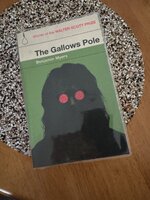
Not sure how well known Myers is outside the UK. Especially considering most of his books focus very much on the North of England (I.e the best bit) but if people have a chance to give him a read he’s pretty good. He’s also quite prolific so there’s a bit to choose from. I’d stayed clear of this one as it’s ‘the famous one’ but as going to have a mini re-read of a few of his this year after Beastings was featured on a podcast I listen too. Kinda regret leaving it so long to pick up. It’s, frankly, absolutely brilliant. Essentially a fictionalisation of a tale of a small economic rebellion in Northern England around the time of the Industrial Revolution with perspectives from the Clipper and Crown sides. A bit of olde English thrown in for good measure amongst some balls to the wall Yorkshire-ness.
Not much I’ve read that I’ve not enjoyed this year. Enjoying this thread immensely too!

Not sure how well known Myers is outside the UK. Especially considering most of his books focus very much on the North of England (I.e the best bit) but if people have a chance to give him a read he’s pretty good. He’s also quite prolific so there’s a bit to choose from. I’d stayed clear of this one as it’s ‘the famous one’ but as going to have a mini re-read of a few of his this year after Beastings was featured on a podcast I listen too. Kinda regret leaving it so long to pick up. It’s, frankly, absolutely brilliant. Essentially a fictionalisation of a tale of a small economic rebellion in Northern England around the time of the Industrial Revolution with perspectives from the Clipper and Crown sides. A bit of olde English thrown in for good measure amongst some balls to the wall Yorkshire-ness.
Not much I’ve read that I’ve not enjoyed this year. Enjoying this thread immensely too!
Thackeraye
Well-Known Member
Extra points for the old-school book cover holder! Reminds me of my school library!Book 9 - The Gallows Pole by Benjamin Myers
View attachment 230918
Not sure how well known Myers is outside the UK. Especially considering most of his books focus very much on the North of England (I.e the best bit) but if people have a chance to give him a read he’s pretty good. He’s also quite prolific so there’s a bit to choose from. I’d stayed clear of this one as it’s ‘the famous one’ but as going to have a mini re-read of a few of his this year after Beastings was featured on a podcast I listen too. Kinda regret leaving it so long to pick up. It’s, frankly, absolutely brilliant. Essentially a fictionalisation of a tale of a small economic rebellion in Northern England around the time of the Industrial Revolution with perspectives from the Clipper and Crown sides. A bit of olde English thrown in for good measure amongst some balls to the wall Yorkshire-ness.
Not much I’ve read that I’ve not enjoyed this year. Enjoying this thread immensely too!
Rowan
Well-Known Member
Whitley Bay library in this caseExtra points for the old-school book cover holder! Reminds me of my school library!
jamieanderson1968
ninniest jackaninny
Been really struggling with reading this year. Been a real slog. Finished 7 books I think, but couldn't really tell you much about any of them other and Micky 7. Had to give up on Buffalo Hunter Hunter after 2 weeks as it was a total unenjoyable slog and I was only half way through.
Selaws
Well-Known Member
Book 9: The Home Invaders: Confessions Of A Cat Burglar by Frank Hohimer (Chicago Review Press, 1975)
I watched "Thief" (starring James Caan) a few weeks ago and the closing credits caught my eye when it stated it was based on a book. Turns out the book is "The Home Invaders: Confessions Of A Cat Burglar" by Frank Hohimer which is actually very, very different to the film, but equally fantastic. I wanted to buy a copy but it looks like its quite a rare book that cant be found for less than a few hundred quid, but I lucked out on a PDF copy. Its a fantastic read that Hohimer wrote whilst in prison. He was a real old school thief with a gentlemanly quality. I thoroughly recommend the book!

I watched "Thief" (starring James Caan) a few weeks ago and the closing credits caught my eye when it stated it was based on a book. Turns out the book is "The Home Invaders: Confessions Of A Cat Burglar" by Frank Hohimer which is actually very, very different to the film, but equally fantastic. I wanted to buy a copy but it looks like its quite a rare book that cant be found for less than a few hundred quid, but I lucked out on a PDF copy. Its a fantastic read that Hohimer wrote whilst in prison. He was a real old school thief with a gentlemanly quality. I thoroughly recommend the book!

Bull Shannon
Well-Known Member
Book 6: Babel-17, by Samuel DelaneyBook 3: My Brilliant Friend, by Elena Ferrante
View attachment 227111
I managed to go without hearing of this book until a couple months ago, when the Times published their list of the 100 best books of the century so far; this one headed the list with what seems to be unanimous praise.
And I’d say it lives up to the hype; Ferrante’s prose is simple, direct and propulsive, but still carries a certain beauty. You really come to feel that the apartments/village these girls live in is their entire world. My only gripe is I wish I’d bought a physical copy; the cast of characters is deceptively large, and I’d have flipped to the character list more often (flipping is prohibitive on an ebook reader!).
Book 4: You Dreamed of Empires, by Alvaro Enrigue
View attachment 227112
This popped up on my radar as one of NYT’s best books of 2024, and the description sounded up my alley: an alternate history retelling of the meeting of Moctezuma and Hernando Cortez, told with Borges-ian surrealism and recognition that the conquistadors probably didn’t wipe their asses well.
The book itself is a bit different from that description; Enrigue sort of paints a portrait of the days and moments before and after the meeting; and while the book is structured with sections before, during, and after a nap taken by Moctezuma, the narrative constantly flits about these moments with little distinction given the reader. Along with this and an adherence to cultural lingo as well as a complete lack of quotation marks and paragraph breaks between speakers, it’s hard to get one’s arms around what’s happening in the book.
The effect is a deliberately confusing, psychedelic mess. I’m glad I stuck it out, but I’m still wrestling with the overall effect.
Book 5: Orbital, by Samantha Harvey
View attachment 227113
This seemed up my alley: literate, emotional, scientific fiction. Harvey presents a portrait of six astronauts in orbit as they contemplate their relationships with the Pale Blue Dot, shifted via new perspective.
Unfortunately, the prose is claggy, and Harvey can’t help but append each detail with a list of more details, repeated details, repetitive details; there’s a wordcount-padding sense that if you’re going to mention a kitchen, you’d best mention the refrigerator, stove, cupboard, dishwasher, sink. I don’t know if there’s a name for the rhetorical device of calling something “big and small,” or “everything and nothing,” but it really clangs when you see it on every page:
Every page is like this.
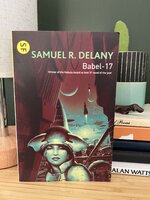
Delaney’s loomed in my list of to-reads, particularly his dense opus Dhalgren. This is an early novel from him, a Nebula winner considered his first major work. The ideas certainly fall into the category of mid-century progressive sci-fi, where a lot of for-the-time revolutionary ideas come across as a bit retrograde; for example, spaceships in this world must be piloted by three individuals in a throuple. This may be wild to talk of in the 60s but in 2025 I just don’t care about your polycule.
Book 7: The Shadow of the Torturer, by Gene Wolfe
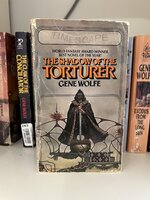
Once more on my bullshit, reading the 4-volume Book of the New Sun for the third time, segueing into my second full reading of the 12-volume Solar Cycle.
Book 8: The Story of a New Name (Neapolitan Quartet, Book 2), By Elena Ferrante

Here we are, volume 2 of the Neapolitan Quartet. Ferrante’s prose remains deceptively simple and ultimately exceptional. I’m glad I got a hard copy of this one; there are around a dozen families in the community discussed here, and being able to flip to the character list helped keep things straight.
The book starts a bit slowly, then comes to focus on a specific summer, and the story begins to really hum. It’s a subtly affecting book; I caught myself in a bad mood after reading a passage of struggle for our protagonists. I’m impressed by this saga of two “little” lives, and the expansiveness of experience; it’s deeply meaningful but not overly metaphorical.
Book 9: The Law at Randado, by Elmore Leonard

I was sick in bed off and on for a week, and wanted something uncomplicated to sink my teeth into. This mid-century tale about a small American West town where the business leaders self-appoint their own judge, jury, and executioner — to circumvent due process and hang cattle rustlers in-town rather than send them to the city — maybe wasn’t as hard a turn from reality as I’d like, but watching the town’s young sheriff deputy hunt down the self-appointed oligarchs was pretty satisfying.
Fleetwood-Matt
Well-Known Member
Book 5: The Chronicles of Narnia: The Lion, The Witch, and the Wardrobe by C.S. Lewis

Yeah this book is just a nice fantasy adventure. Not too deep but just so magical and whimsical that it doesn’t hurt the story. The thing that really struck me is just how funny the writing of this is. Stuff like the narrator addressing the reader directly are a lot of fun and then one joke in particular really got. All book they are talking about how the witch has “deep magic from the dawn of time” and then at the end they reveal the lion has “deeper magic from before the dawn of time” which is just such a really silly bit that got me.
I will say this kinda made me like book 1 less in retrospect. There is lore in this that is not discussed in book 1 and there lore in that which never comes up in this. Makes book 1 feel less vital than it is. And I hear book 3 is easily the worst so this should be interesting
Rating - 4/5

Yeah this book is just a nice fantasy adventure. Not too deep but just so magical and whimsical that it doesn’t hurt the story. The thing that really struck me is just how funny the writing of this is. Stuff like the narrator addressing the reader directly are a lot of fun and then one joke in particular really got. All book they are talking about how the witch has “deep magic from the dawn of time” and then at the end they reveal the lion has “deeper magic from before the dawn of time” which is just such a really silly bit that got me.
I will say this kinda made me like book 1 less in retrospect. There is lore in this that is not discussed in book 1 and there lore in that which never comes up in this. Makes book 1 feel less vital than it is. And I hear book 3 is easily the worst so this should be interesting
Rating - 4/5
Last edited:
BjorgenFjorgen
Well-Known Member
Book 3 was my fave as a kid and again when I reread them just before the pandemic.Book 5: The Chronicles of Narnia: The Lion, The Witch, and the Wardrobe by C.S. Lewis
View attachment 231724
Yeah this book is just a nice fantasy adventure. Not too deep but just so magical and whimsical that it doesn’t hurt the story. The thing that really struck me is just how funny the writing of this is. Stuff like the narrator addressing the reader directly are a lot of fun and then one joke in particular really got. All book they are talking about how the witch has “deep magic from the dawn of time” and then at the end they reveal the lion has “deeper magic from before the dawn of time” which is just such a really silly bit that got me.
I will say this kinda made me like book 1 less in retrospect. There is lore in this that is not discussed in book 1 and there lore in that which never comes up in this. Makes book 1 feel less vital than it is. And I hear book 3 is easily the worst so this should be interesting
Rating - 3/5
ranbalam
Well-Known Member
Book 10 - The Spy and the Traitor - Ben Macintyre
One of my SILs recommended this, and as I was stalling on it about halfway through she mentioned it was the audio book version that she was talking about. That would certainly have been an easier way to consume the info here. It's dense, but a fantastic story.
Moving on to some fiction next.
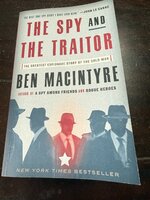
One of my SILs recommended this, and as I was stalling on it about halfway through she mentioned it was the audio book version that she was talking about. That would certainly have been an easier way to consume the info here. It's dense, but a fantastic story.
Moving on to some fiction next.

